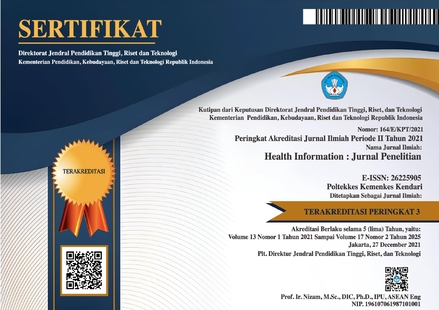Inhibition Test of Avocado Leaf Extract (Persea americana mill) on the growth of Escherichia coli
DOI:
https://doi.org/10.36990/hijp.v9i2.70Keywords:
Avocado leaf, Escherichia coli, Inhibitory power testAbstract
Avocado leaves (Percea americana mill) are a part of avocado plants that have benefits as traditional medicines. Avocado leaves are potentially used as anti-diarrhea based on the content of chemicals contained therein, namely saponins, alkaloids, tannins, flavanoids, polyphenols, quercetin which are used to kill pathogenic bacteria, one of which is Escherichia coli. Escherichia coli is an opportunist germ that is commonly found in the human intestine as a normal flora. The purpose of this study was to determine the inhibition of avocado leaf extract on the growth of Escherichia coli bacteria. This type of research is an Experimental laboratory. The research design used in this study was static group comparison because this study was conducted to see differences in concentrations of 10%, 15%, 25%, 50% and 75% of avocado leaf extract in inhibiting the growth of Escherichia coli bacteria by looking at the clear zone formed. The results showed that at a concentration of 25%, 50% and 75% a clear zone (inhibition zone) was formed, whereas at concentrations of 10% and 15% no clear zone (inhibition zone) was formed. From the results of this study it can be concluded that avocado leaf extract can inhibit the growth of Escherichia coli at concentrations of 25%, 50% and 75%.
References
Arlita, Yolanda, Rares, Fredine E.S, Soeliongan, Standy. Identifikasi bakteri Escherichia coli dan Salmonella sp. Pada Makanan Jajanan Bakso Tusuk di Kota Manado.
Depkes RI. (2001). Inventaris Tanaman Obat Indonesia I Jilid 2. Badan Penelitian dan Pengembangan Kesehatan. Jakarta.
Felina, dkk. (2014). Daya Hambat Ekstrak daun Alpukat (Persea Americana Mill) Terhadap Pertumbuhan Streptococcus mutans. Skripsi Fakultas Kedokteran Gigi, Universitas Hang Tuah Surabaya.
Giske, C.G., Eriksson, A., Ternhag, A, 2012. The relative importance of Staphylococcus saprophyticus as a urinary tract pathogen: distribution of bacteria among urinary samples analysed during I year at a major Swedish laboratory. 121(1)swedia : APMIS. Available from http://www.ncbi.nlm.nih.gov/pubmed/23030816
Ismiyati, N. (2014). Pengembangan formulasi masker ekstrak air daun alpukat (Persea americana Mill) sebagai antibakteri Staphylococcus aureus untuk pengobatan jerawat. Jurnal kefarmasian Universitas Ahmad Dahlan. Yogyakarta.
Juliantina, F., D.A Citra, B. Nirwani. (2008). Manfaat Sirih Merah (Piper crocatum) Sebagai Agen Anti Bakterial Terhadap Bakteri Gram Positif dan Gram Negatif. UII Press. Yogyakarta.
Kusuma, Sri Agung Fitri. (2010). Escherichia coli. Universitas Padjadjaran Fakultas Farmasi Bandung. http://pustaka.unpad.ac.id/wpcontent/uploads/2011/09/pustaka_unpad_Es cherichia-coli.pdf.
Kementerian Kesehatan RI, (2011). Profil Kesehatan Indonesia 2010. http://www.depkes.go.id.
Poeloengan, M dan Pratiwi. (2010). Uji Aktivitas Antibakteri Ekstrak Kulit Buah Manggis (Garnicia mangostana Linn), (Online), (http://digilib.litbang.depkes.go.id/filesdisk174/jkpkbppkgdl-grey-2001-masniaripo-3692-manggism-i.pdf)
Utami, P. (2013). Buku Pintar Tanaman Obat. Agro Media, Tangerang
Downloads
Published
How to Cite
Issue
Section
Citation Check
License
Copyright (c) 2017 Tuty Yuniarty, Lisfaresliana Hasjim (Authors)

This work is licensed under a Creative Commons Attribution-ShareAlike 4.0 International License.
Authors retain copyright and grant the journal right of first publication with the work simultaneously licensed under a Creative Commons Attribution-ShareAlike 4.0 International License that allows others to share the work with an acknowledgment of the works authorship and initial publication in this journal and able to enter into separate, additional contractual arrangements for the non-exclusive distribution of the journals published version of the work (e.g., post it to an institutional repository or publish it in a book).















